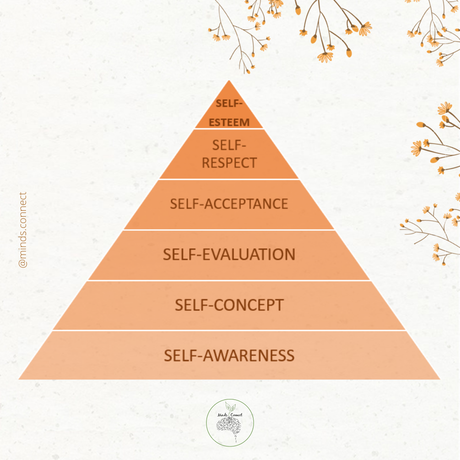|
Self-esteem reflects the opinion we have of ourselves, the judgments we make of ourselves and the value we place on ourselves as people. Self-esteems refers to an attitude towards oneself. When we say it is an attitude, we refer to the habitual way of thinking, loving, feeling and behaving with oneself. Self-esteem shapes our personality, sustains it and gives it meaning. It is generated as a result of the history of each person. Self-esteem has a dynamic nature, it can grow and it can weaken. We have to continuously nourish it.
The beliefs about ourselves, other people and about life are all learned. They have their roots in our experiences. Our beliefs about ourselves can be seen as conclusions we have come to on the basis of what has happened to us. This means that, however unhelpful or outdated they may now be, they are understandable – there was a time when they made perfect sense, given what was going on for us. Remember that core beliefs are there to protect us. The key is to identify now, as adults, if we need to continue ¨believing¨in them or if they no longer serve us. Also, remember that the negative beliefs about ourselves are opinions, not facts. They are conclusions about ourselves based on past experiences (usually, but not necessarily, early experiences). A broad range of experiences, including both the presence of negatives and the absence of positives, can contribute to our core belief, and to our self-esteem. It is quite common to confuse self-esteem with self-concept and use both as synonymous terms. Although the two concepts are related, they are not equivalent. In self-concept, the cognitive dimension prevails, while in self-esteem the evaluative and affective dimension prevails. We can say that self-esteem develops from childhood and is impacted by the interactions, opinions, emotional availability that we have received from our primary caregivers, on top of other significant interpersonal relationships experiences. Not only are the words we receive what matter, but the behaviors, the responses that our parents and other meaningful relationships have had towards our demands and needs. As an example, imagine that as a child you have been excited about something and wanted to show it to your mother. She then told you "oh, that it is beautiful", however, she did not look at you, did not approach you and did not connect with your need to be valued. If this happens repeatedly, it will, most likely, impact your self-concept ("what I do is not important enough" "what I say is not interesting enough") and it will affect how my self-esteem develops. So it is important to consider that not only what we say about others is important, but how do we relate to them. Is the quality of the attachment and interaction that will affect our valuation of ourselves. Regarding the self-concept, we can say that it influences the way we appreciate the events, situations and people in our life. If I have a negative perception of myself, I will not value my achievements the same as if my perception of myself is positive. At the same time, the self-concept influences considerably the behavior and the experiences of the individual. The person develops their self-concept, creates their own self-image Self-esteem has 3 interrelated components 🌸Cognitive Component: the set of knowledge about oneself. The representation that each one forms about their own person. This varies according to psychological maturity and cognitive capacity. It indicates ideas, opinions, beliefs, perception, and information processing. Self-concept occupies a privileged place in the genesis, growth, and consolidation of self-esteem, and the remaining dimensions walk under the light that the self-concept projects to them, which in turn is accompanied by the self-image or mental representation that the person has of themselves in the present and in the future (aspirations and expectations). 🌸Affective Component: Value and worth that we attribute to ourselves and the degree to which we accept ourselves. It can have a positive or negative nuance according to our self-esteem: "There are many things about me that I like" or, on the other hand, "I don't do anything well, I'm useless." We make a judgment and have a feeling around our personal qualities. 🌸 Behavioral component: Related to intention, decision to act, and to carry out a process in a coherent way. It is self-affirmation directed towards the own self and in search of consideration and recognition on the part of others. It is the effort to achieve respect for others and for ourselves. It includes the set of skills and competencies that each person possesses when demonstrating their attitude to the outside. Self-esteem pyramid 🌸 Self-awareness has to do with knowing your strengths and weaknesses, understanding what are the personal qualities that you have. 🌸 Self-concept is the beliefs and ideas about oneself. The self-concept has to do with the cognitive dimension of what you believe about yourself, your self-perception. It will create your self-image and will impact the way you behave. 🌸 Self-evaluation is the inner capacity to evaluate our behaviour as positive or negative. Has to do with the meaning associated with our achievements and failures. 🌸 Self-acceptance has to do with an individual's acceptance of all of his/her attributes, positive or negative. Accepting all our parts as a whole. This does not mean that you like them, but you do accept them. 🌸 Self-respect means honoring your worth, preserving your dignity, and taking pride in your abilities, take responsibility for your emotions. 🌸 Self-esteem is a person's overall sense of self-worth or personal value. In other words, how much you appreciate yourself. Is the affective and emotional component of the self-concept. Leave your comments below! * Based in the work of Melanie Fennell , and the Self-Esteem Pyramid model of Jesús Diaz Ibañez
0 Comments
Leave a Reply. |
AuthorHi there! Archives
January 2022
Categories |

 RSS Feed
RSS Feed
